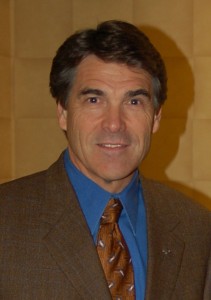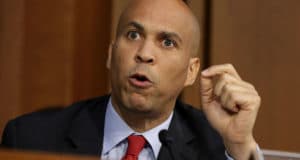Rick Perry is a fifth-generation Texan, the son of tenant farmers, an Eagle Scout, the first from his family to ever attend college, and currently the longest-sitting governor in the nation. Beginning his political career as a Democrat and forging his place as a dominant conservative force among Republicans, Perry will indeed be a game changer in the primaries if he decides to run.
Biography
 James Richard Perry was born in 1950 north of Abilene in the tiny town of Paint Creek, Texas. His father had been a tenant farmer and rancher who also served, as a Democrat, as county commissioner and a school board member. While attending Paint Creek High School, Perry achieved the rank of Eagle Scout, for which he was later honored with the Distinguished Eagle Scout Award.
James Richard Perry was born in 1950 north of Abilene in the tiny town of Paint Creek, Texas. His father had been a tenant farmer and rancher who also served, as a Democrat, as county commissioner and a school board member. While attending Paint Creek High School, Perry achieved the rank of Eagle Scout, for which he was later honored with the Distinguished Eagle Scout Award.
The first from his family to ever attend college, Perry graduated from Texas A&M University in 1972 with a degree in animal science. After graduation he became a commissioned officer in the United States Air Force, piloting C-130s in the Middle East and Europe. Upon fulfilling his commitment, Perry left the Air Force with the rank of captain to return to cotton farming with his father in Texas. Perry married Anita Thigpen in 1982, and they have two children, Griffin and Sydney. A nursing graduate of West Texas State University, Perry’s wife has headed up numerous health care initiatives that focus on health education, nutrition, early childhood programming, and cardiovascular disease.
Political Career
Rick Perry’s first foray into the world of politics and public service was in 1978 when he was elected as a Democrat to the Texas State Board of Education. In 1985 he won election to the Texas House of Representatives and three years later switched parties. He has been a Republican ever since. In 1991, Perry became State Agriculture Commissioner, a position he held until 1999 when he became Lieutenant Governor under George W. Bush. When Bush resigned the governorship, Rick Perry became the 47th Governor of Texas. From there he was elected in 2002, 2006 and 2010. As a result, Perry is the only person to have ever been elected Governor of Texas for three terms.
From the day he took office as Governor in 2000, Rick Perry has proven to be a determined executive willing to take controversial stands in spite of vocal opposition from critics. The year after taking office, he had the distinction of vetoing more bills than any governor since reconstruction. Eighty two times he vetoed the Democrat dominated State Senate and House, proving he could forge a new direction based on the mandate of the voters.
Policies and Stands
With his impressive tenure as governor, Rick Perry’s views are a matter of public record and a fairly good gauge of the agenda he would have if elected president. A synopsis of issues he championed and stands he took over the last decade include:
- Spending and Taxes – Faced with a record $10 billion budget shortfall in 2003, Perry became the first post-World War II Texas governor to sign a budget that lowered state spending. Using the power of the line item veto, Perry cut three billion dollars in proposed spending.
- Job Creation – More jobs were created in Texas that any other state in 2010 and over the past decade. Texas has consistently ranked as the nation’s best place to do business and create jobs since Perry assumed the helm of state government.
- Education – Perry fought for better schools through a combination of raising teacher’s pay by $2,000; a return to the basics of math, history, and science; and enforcing higher standards and greater accountability. Perry mandated 65% of every tax dollar be spent directly in the classroom and ordered all districts to make their financial records public for all taxpayers to see. Today Texas has the nation’s largest teacher performance pay program and is recognized as a leader in preparing students to graduate high school college- or career-ready. As a result of Perry’s leadership, students scores in Texas continue to rise and a record number graduate and enter college.
- Healthcare and Tort Reform – Under Perry, Texas has made enacted broad lawsuit reforms and closed the door on frivolous lawsuits. Because of this, both malpractice claims and premiums have fallen and physicians have applied in record numbers to practice medicine within the state.
- Border Security – Considering Texas has the single largest border with another country of any state in the nation, what the governor of that state enacts is bound to be noticed by the entire nation. As governor Perry has pushed for an aggressive border security strategy and significantly increased the resources necessary face the problem.
- Social Issues – Perry is a long time opponent of abortion and signed a bill that limits late-term abortions, requiring girls under the age of 18 to obtain parental consent to get an abortion. Governor Perry unwaveringly defines marriage as between a man and a woman and is a vocal opponent of gay marriage.
Controversies
No political leader that takes the open stands Rick Perry has escapes criticism. Libertarians and liberals alike take issue with his support for the subjects of creationism and intelligent design being taught in Texas schools, despite it being rejected by a federal court. Environmentalists have opposed him directly because of his rejection of the idea of man-made global warming.
Perry’s executive order that required every girl in Texas to get a costly Human papillomavirus vaccine before they could enter the sixth grade probably has received more scrutiny than anything else in his long career. When he issued the order, the drug company Merck had the only such vaccine that had been approved by the FDA. The decree drew national press attention, pointing out a $6000 contribution by the drug company to Perry’s campaign fund. Concerned families sued to block the order, and the executive order was rescinded a few months later.
Conclusions
No one can say Rick Perry is unwilling to tackle controversial issues. He has consistently affirmed states rights as guaranteed by the 10th Amendment of the US Constitution. In an official press release in 2009 he said:
I believe that our federal government has become oppressive in its size, its intrusion into the lives of our citizens, and its interference with the affairs of our State. That is why I am here today to express my unwavering support for efforts all across our country to reaffirm the States’ rights affirmed by the Tenth Amendment to the U.S. Constitution. I believe that returning to the letter and spirit of the U.S. Constitution and its essential 10th Amendment will free our State from undue regulations, and ultimately strengthen our Union.
In a much reported Tea Part event, Perry broached a subject few have been willing to publicly voice – the potential of future succession from the Union. When a reporter questioned him about this possibility Perry replied:
Texas is a unique place. When we came into the union in 1845, one of the issues was that we would be able to leave if we decided to do that… My hope is that America and Washington in particular pays attention. We’ve got a great union. There’s absolutely no reason to dissolve it. But if Washington continues to thumb their nose at the American people, who knows what may come of that.
Though Rick Perry is often known for his stand on social issues like abortion and gay marriage, it is likely his accomplishments in the economic arena will have the greatest impact on elections, should he declare himself a candidate. Considering the continuing nose dive our economy is taking and our nation’s mounting debt, it will be hard for anyone to ignore what the sound fiscal policies of Governor Perry and the State of Texas have accomplished. The record speaks for itself and provides a model that other states can only envy.
 Off The Grid News Better Ideas For Off The Grid Living
Off The Grid News Better Ideas For Off The Grid Living




